Understanding the PayPal Portable Card Machine
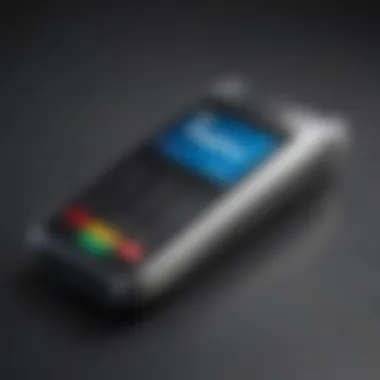
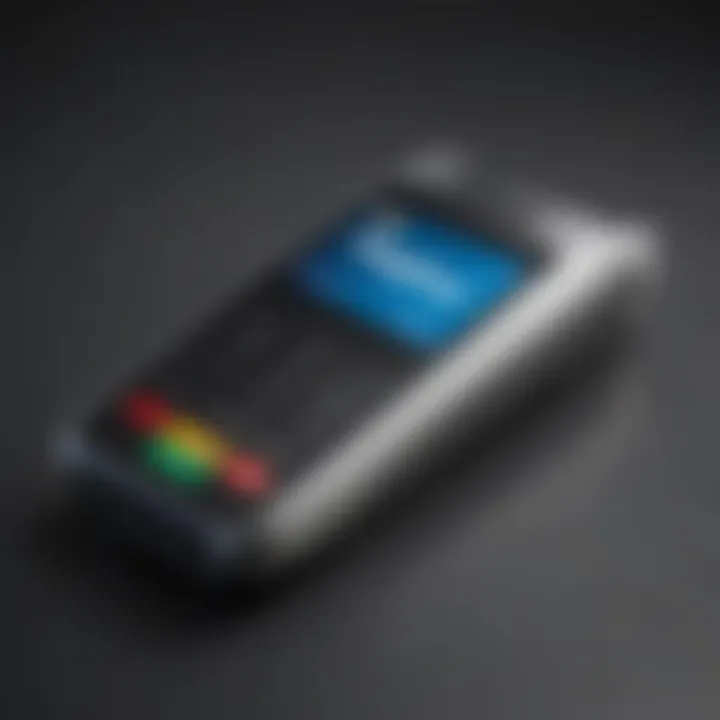
Intro
The digital economy has reshaped how businesses operate, particularly in terms of transactions. Gone are the days when cash ruled supreme; today, convenience is king. With this shift, portable payment solutions have surged in popularity. One such tool making waves is the PayPal portable card machine. Designed to simplify your financial interactions, this device allows businesses to accept payments swiftly, whether at a bustling market stall or a cozy cafe.
But before diving into the hows and whys of using this device, it’s vital to ground the discussion in some foundational concepts. This guide aims to dissect the essential features of the PayPal portable card machine, its advantages over traditional payment methods, and how it positively influences small businesses.
Let’s take a closer look at the terminology and definitions pertinent to this topic, laying a solid groundwork for understanding the capabilities of the device and its practical applications.
Prelude to PayPal Portable Card Machines
The PayPal portable card machine has revolutionized the landscape of retail and service industries, making transactions smoother and more personalized. As businesses adapt to the fast-paced digital world, understanding the significance of these machines becomes pivotal. This section sheds light on the core relevance of PayPal's offerings, especially for smaller enterprises looking to enhance their customer experience.
Evolution of Payment Technologies
Over the years, payment technologies have witnessed monumental shifts. From cash and checks to card payments, the evolution is quite remarkable. Initially, we had nothin' but physical cash changing hands. Fast forward a few decades, and folks began using checks, which added convenience but also some delays. The introduction of credit and debit cards brought about a major transformation; transactions became faster, but the equipment was often bulky and not very portable.
Then came mobile payments, which further changed the game. Think about it—now you can wave your phone near a terminal and voilà! But when it really boils down to it, the true game-changer has been the rise of portable card machines like those offered by PayPal. These nifty gadgets allow businesses to accept payments anytime and anywhere, shedding the chains of a physical location.
PayPal itself has adapted and innovated over these years, shifting from solely an online payment processor to providing a portable solution that’s easy to use and set up. With modern customers favoring convenience, this shift represents a significant milestone in how business transactions are conducted.
Overview of PayPal's Offering
So, what exactly does PayPal bring to the table with its portable card machine? The answer's not short! The device is compact, versatile, and comes packed with various features that cater to the needs of both businesses and customers.
For starters, it's about ease of use. A setup can be completed in just a few minutes, especially attractive for those who are not tech-savvy. Plus, it syncs effortlessly with your existing PayPal account—if you already use PayPal for transactions, you're simply consolidating your processes, streamlining what might otherwise be a cumbersome task.
Also, it supports multiple payment methods, including chip cards, contactless payments, and even mobile wallets, which reflects the modern consumer's diverse preferences. Not to mention, the machine's design makes it easy to carry around—like you’d throw it in your bag and go. This means whether you're at a bustling market, a trade show, or visiting clients, you can accept payments on the go without breaking a sweat.
Core Features of the PayPal Portable Card Machine
The core features of the PayPal portable card machine play a pivotal role in understanding its functionality and utility in today’s fast-paced financial landscape. As businesses increasingly look for solutions to streamline payments, knowing these essential characteristics can facilitate informed decisions. Each feature is designed not only to improve transactional efficiency but also to enhance the customer experience. This section will delve deep into three fundamental features: card reading capabilities, integration with PayPal accounts, and user-friendly interface.
Card Reading Capabilities
The card reading capabilities of the PayPal portable card machine are central to its appeal. This device supports both contactless and chip card technologies, allowing merchants to accept payments from numerous card brands. As a result, it caters to a broad customer base, making it a versatile option for various business types, from food trucks to retail shops.
Moreover, the machine can process payments through mobile wallets, such as Apple Pay and Google Pay. This is particularly important as more consumers opt for digital payment methods, shifting the payment dynamics toward non-cash transactions.
"With the card reader's robust support for multiple payment types, businesses can accommodate customer preferences, enhancing satisfaction and potentially boosting sales."
Integration with PayPal Accounts
Another standout aspect is how seamlessly the PayPal portable card machine integrates with existing PayPal accounts. For businesses already using PayPal for online transactions, this integration simplifies their operations significantly. Merchants can manage all transactions—both online and offline—under a single PayPal dashboard. This not only streamlines bookkeeping but also allows for simpler tracking of sales and inventory.
Setting up the device is straightforward, requiring only a few taps to link it to a PayPal account. This means that small business owners can start processing payments without getting bogged down in the complexities of technological setups. Since many people already trust PayPal, this familiarity may encourage more customers to make their purchases. Selling has never been lighter!
User-Friendly Interface
In today’s world, users often shy away from overly complicated technology. The user-friendly interface of the PayPal portable card machine caters to this by providing an intuitive design. The touchscreen interface is equipped with clear prompts and a colorful layout, making navigation straightforward for users with varying levels of technological proficiency.
The machine also provides instant access to transaction history, allowing users to keep an eye on their sales without needing to dive deep into advanced reports or analytics.
Additionally, the device requires minimal training for staff, which translates to faster adaptation times for businesses. With less time spent on training, employees can focus on more critical aspects of customer service.
In summary, the core features of the PayPal portable card machine are crucial selling points that elevate its standing in the market. By understanding its card reading capabilities, integration with PayPal accounts, and user-friendly interface, businesses can make informed choices that align with their operational needs.
Setting Up the PayPal Portable Card Machine
Setting up the PayPal Portable Card Machine is a fundamental step that forms the backbone of utilizing this innovative payment solution effectively. It's not just about turning the device on and off; it involves a series of steps aimed at ensuring that the machine performs at its peak capabilities. A well-configured card machine can significantly boost a business’s ability to process payments smoothly, which is increasingly vital in today’s fast-paced market. Whether you're a seasoned entrepreneur or a newcomer to the retail scene, understanding the setup process can save time and prevent headaches later on.
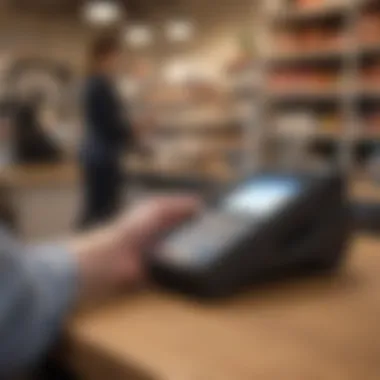
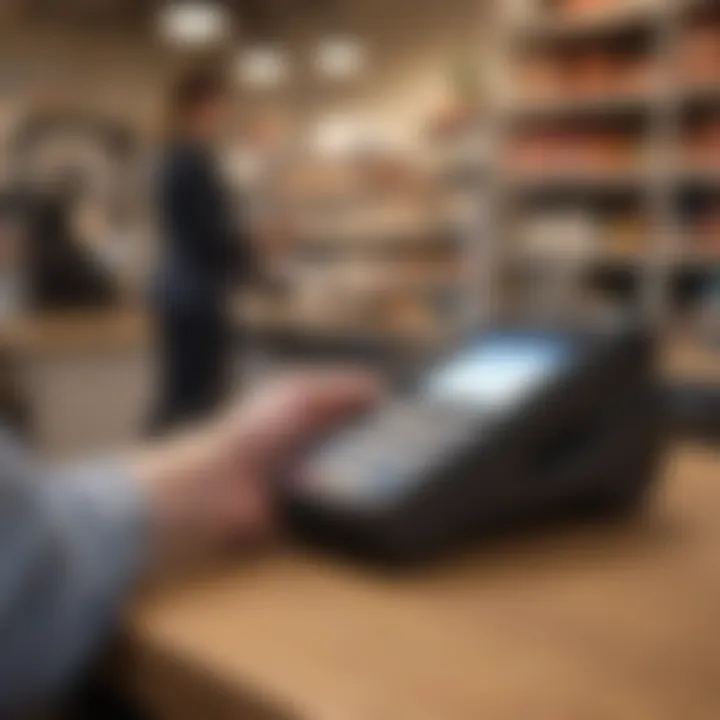
Initial Configuration Steps
Before anything else, it's crucial to ensure that the device itself is in top shape. First, make sure you charge the device or plug it into a power source. After that, the initial setup kicks off with selecting your preferred language—this can set the tone for a smoother operation.
Next comes one of the essential steps: linking your PayPal account. This process involves entering your account credentials, including your email and password. For those who might have forgotten their password, it’s worth checking the recovery options earlier, saving you from unwanted delays during setup. If you’re setting up multiple devices, using the same account can streamline processes and keep track of sales easily.
- As you go through the configuration, remember that a stable internet connection is key. You wouldn't want to risk the connection dropping midway through a transaction.
- You might also want to customize settings such as currency preferences and receipt options since these settings cater directly to your business model.
"A properly set up machine can act as a silent partner in your business transactions, enhancing customer trust and satisfaction."
Connecting to Wi-Fi and Mobile Networks
Once you've got the initial steps sorted, the next piece of the puzzle involves connecting to a Wi-Fi network or mobile network. This is a non-negotiable step, as the PayPal Portable Card Machine operates via these networks to process transactions in real-time.
- Wi-Fi Connection: To connect to Wi-Fi, go to the network settings on your device. Scan available networks and select yours. Enter the password when prompted; if you don’t have a secure password, consider setting one up to bolster your device's security.
- Mobile Network: Alternatively, the machine can also sync with mobile networks. For this, you often need a SIM card inserted. Make sure your SIM is activated and has data—this is nothing fancy, just your basic mobile plan should suffice.
- Once connected, always test the connection by processing a small transaction. It helps solidify your confidence in the setup and makes it easier to identify connectivity issues before they arise during busier times!
With these steps tackled, you have established a solid foundation for your PayPal Portable Card Machine, ensuring it's ready to handle transactions effectively. Remember, the initial setup might seem tedious, but a little patience now can save you a lot of trouble down the road.
Benefits of Using PayPal Portable Card Machines
The use of PayPal portable card machines brings a multitude of advantages—especially for smaller businesses that are looking to enhance their payment options. As payments evolve, so does the need for flexibility and efficiency. From cafés buzzing with activity to craft vendors at fairs, these devices help streamline operations and improve customer satisfaction.
Enhanced Mobility and Flexibility
Mobility is key in today's fast-paced market. PayPal portable card machines can be used nearly anywhere, allowing businesses to cater to customers on the spot.
Imagine a local artisan at a bustling street fair. Instead of being tethered to a fixed register, they can sell their handmade goods wherever the crowd flows. This level of flexibility can significantly boost sales, as customers can make impulse purchases without being limited by payment options. Additionally, the compact design and lightweight nature of these devices make them easy to transport, so business owners are not tied to a single physical location when managing sales. The power of convenience cannot be overstated, as it leads to higher customer satisfaction and, ultimately, repeat business.
Streamlining Transactions
When it comes to transactions, speed and efficiency are the name of the game. PayPal portable card machines facilitate swift payments, keeping lines moving and customers happy. With the ability to accept various forms of payment—whether credit cards, debit cards, or mobile wallets—businesses can cater to diverse consumer preferences.
This versatility reduces wait times and enhances the overall shopping experience. No one enjoys waiting in a long queue, and long transaction times can lead to customer frustration. Customers are far more likely to return to a business that speedily processes transactions. With PayPal's reliable system, businesses can also track sales data in real-time. This feature ensures that business owners have accurate reports at their fingertips, allowing them to make informed decisions quickly.
Cost-Effectiveness for Small Businesses
For small businesses, every penny counts. PayPal portable card machines often come with lower fees compared to traditional banking methods. This aspect makes it an attractive choice for entrepreneurs who are just starting out.
Many small enterprises find themselves navigating budget constraints, and the ability to minimize costs associated with payment processing is invaluable. Furthermore, the lack of long-term contracts offers entrepreneurs unwanted flexibility and freedom, allowing them to scale without being burdened by commitments. This can provide a significant advantage when competing against larger corporations that may utilize more rigid pricing models.
"Flexibility in payment processing is not just convenience; it's a strategy that can determine a small business's survival."
In summary, the benefits of using PayPal portable card machines are clear: they enhance mobility, streamline transactions, and offer cost-effective solutions tailored for small businesses. As the market continually shifts toward consumer convenience, investing in such technology can prove a wise decision for businesses aiming to thrive.
Limitations and Considerations
When delving into the operation of a PayPal portable card machine, understanding its limitations and considerations is vital. While the machine offers numerous advantages that cater to today’s mobile payment needs, there are specific hurdles that users must acknowledge. These limitations can significantly impact user experience and business performance, especially for those who may not have a solid grasp of the gadget’s operational constraints.
Transaction Fees
One of the most pressing concerns when using the PayPal portable card machine revolves around its transaction fees. Although PayPal is often praised for its user-friendly approach, they do impose charges on each transaction completed through the machine. These fees can eat into profit margins if not calculated properly. For example, a typical fee may range around 2.7% of sale value plus an additional fixed fee depending upon the currency. This means for every $100 sale, around $2.70 goes back to PayPal, which can add up if sales are frequent or in high volume.
Some businesses, especially smaller operations, may feel the pinch. For instance, if a local artisan makes a series of small sales at a craft fair, the cumulative fees can make a noticeable dent in earnings. Thus, it’s essential for users to conduct thorough calculations on potential fees based on their expected sales volume.
"In the world of business, every penny counts. Understanding fees can directly affect how much you take home at the end of the day."
Dependency on Internet Connectivity
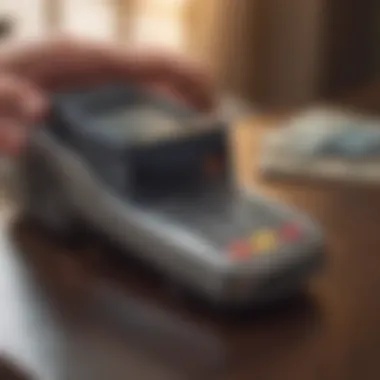
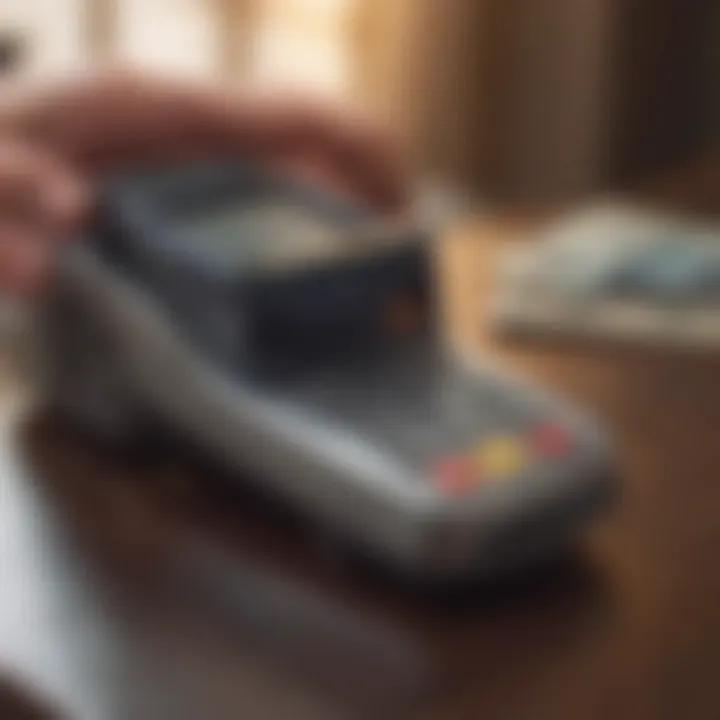
Another notable limitation is the reliance on internet connectivity. Since the PayPal portable card machine processes transactions through Wi-Fi or mobile data, any connectivity issues can halt payment processing. In places where coverage is shaky, like certain rural areas or crowded events, this can pose a real headache for merchants.
Imagine a food vendor at a busy festival where the network gets overwhelmed. Long lines can form as customers struggle to process their payments, leading to frustration and possibly lost sales. Moreover, if a connection is lost during a transaction, it can lead to confusion about whether the payment was successful, which might cause a chaotic situation for both customers and vendors.
In summary, while the PayPal portable card machine stands out as a convenient tool for modern transactions, potential users should fully grasp its limitations. Understanding the financial implications of transaction fees and the critical need for stable internet connectivity are fundamental when considering its incorporation into the business models of financial enthusiasts and small business operators.
Comparative Analysis with Competing Products
The landscape of portable payment processing devices is competitive, with numerous products vying for attention in the market. Understanding how the PayPal portable card machine stacks up against its rivals is critical for businesses aiming to optimize their financial transactions. The analysis not only sheds light on the strengths and weaknesses of different options but also assists purchasing decisions based on specific needs and industry requirements.
A successful comparative analysis considers several key aspects: functionality, pricing, user experience, and integration capabilities. By examining these elements, businesses can make informed choices that align with their operational goals. PayPal's reputation in the financial sector adds another layer of relevance in this discussion, using it as a reference point for evaluating alternative solutions.
Square versus PayPal
Square and PayPal are two giants in the portable payment processing arena, each offering unique features that cater to varying needs. Square's devices are often recognized for their sleek design and user-friendly setup process, making them an excellent choice for pop-up shops and events. On the other hand, the PayPal portable card machine integrates seamlessly with existing PayPal accounts, which is a substantial benefit for businesses already entrenched in the PayPal ecosystem.
When comparing transaction fees, Square employs a flat-rate model that might appeal to smaller businesses that prefer predictability. However, PayPal's tiered pricing can offer savings for larger transactions, making it an attractive option for businesses with fluctuating sales.
In terms of user experience, Square boasts a distinct point of sale (POS) system that includes inventory management features. In contrast, the PayPal machine focuses on quick transactions, relying on its widely trusted platform to ease fears regarding security and processing delays.
Stripe's Market Position
Stripe occupies a different niche in the payment processing landscape. While PayPal and Square primarily focus on consumer-facing transactions, Stripe tends to appeal more to e-commerce businesses requiring robust online solutions. Stripe’s platform is highly customizable, allowing developers to create tailored payment experiences that align precisely with their business models.
Despite its advantages, Stripe does not offer a portable card machine like PayPal or Square does, which may limit its usability in environments requiring physical transactions. This creates a gap for those seeking easy mobility alongside robust online capabilities. However, for businesses prioritizing online sales, Stripe's suite of APIs presents a compelling reason to choose it over other options.
"In the realm of payment solutions, knowing your needs is just as important as knowing the products available. A tailored approach can significantly enhance transaction efficiency and customer experience."
User Experiences and Testimonials
User experiences and testimonials are vital components when gauging the performance and central benefits of PayPal's portable card machines. They serve as a real-world litmus test, shedding light on not just the technical specifications but how well the device holds up in practical, everyday use. When potential buyers assess this technology, they're often hunting for narratives that resonate with their own situations, hoping to either validate their choices or guide their decisions.
First off, there’s much to be gained from the diverse stories of actual users. The reflections shared by small business owners and event organizers can divulge unexpected insights into the usability of the product. These accounts often spotlight aspects that technical specifications don’t cover, such as how the machine stands the test of busy, high-stakes transactions like during a packed sidewalk sale.
Real-life experiences emphasize how swift and secure payment processing can directly influence customer satisfaction, a key element for thriving in competitive landscapes. In short, testimonials can reveal whether this device becomes a boon for business operations or merely another gadget cluttering a workspace.
"When I used the PayPal card machine during my food truck operations, I noticed that customers preferred the speed and security it provided. It helped me reduce wait times significantly!" - Local Food Truck Owner
Case Studies: Small Business Owners
A detailed look at case studies involving small business owners reflects the practical benefits of the PayPal portable card machine. For instance, take Sarah, who runs a thriving homemade candle business. Prior to acquiring this machine, her transactions were predominantly cash-based, causing delays during busy markets. Once she switched to the PayPal device, she not only accepted debit and credit cards but also ensured that sales were processed on the spot. This change drastically improved her workflow and customer satisfaction. Sarah even reported a 30% uptick in sales due to the instant payment processing.
Similarly, James, who operates a lawn care service, shared how the machine has become indispensable. While mowing a client's lawn, he can now accept payments immediately through his mobile device. This immediacy has led to several referrals, as satisfied customers rave about the convenience. They often appreciate how easy and professional it feels to make a payment on the spot.
With such case studies, it becomes clear that the PayPal portable card machine is increasingly perceived as not just a tool, but a vital partner in building and sustaining customer relationships.
Feedback from Event Organizers
The event organizing sector has a different but equally telling perspective on user experiences with the PayPal portable card machine. For those at the helm of exhibitions and festivals, efficiency is paramount. Take, for example, the experience of Mia, who coordinates annual art fairs. With scores of artists and visitors, swift transaction capability is critical. In her latest event, she utilized the PayPal machine during two bustling weekends. Mia noted that the ease of use for both vendors and attendees significantly lessened the transaction wait times, which often tend to stretch at large gatherings.
Moreover, Howard, who organizes a local marathon, utilized the card machine at registration points. By allowing digital transaction options, the team collected entry fees quicker than they ever had before. His feedback highlights that the machine wasn't just a tool for transactions; it also lifted the overall mood of participants by minimizing long queues and encouraging more people to join impromptu activities throughout the event.
Feedback like this from event organizers shows how the PayPal portable card machine plays an integral role beyond the simple act of processing payments. It bolsters the overall event experience, creating an environment that’s customer-friendly and engaging.
Security Features of PayPal Portable Card Machines
In an age where digital transactions are as common as swiping a card at a store, security is paramount. The PayPal portable card machine isn’t just a nifty gadget for processing payments on the go; it’s built with a host of security features designed to protect sensitive financial data. Understanding these security measures is crucial, particularly for small business owners who often handle transactions in various settings. With the right knowledge, one can leverage these features to ensure not just compliance but also consumer trust.
Encryption and Data Protection

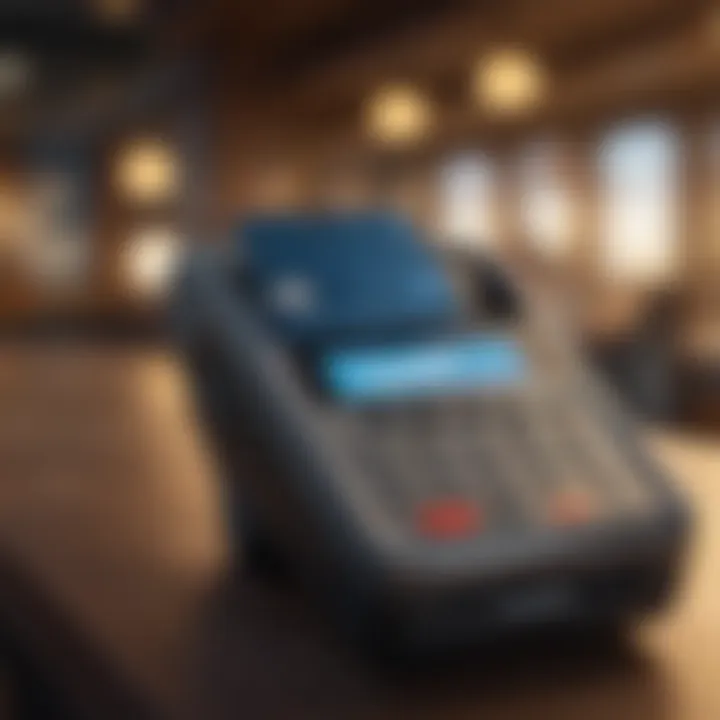
Encryption plays a critical role in safeguarding transaction data from prying eyes. The PayPal portable card machine utilizes end-to-end encryption, meaning that your customer’s card information is scrambled during transmission, rendering it useless to any interceptors. This feature ensures that when a card is swiped or tapped, the information is securely transmitted to PayPal's servers, where it is decrypted.
Moreover, PayPal employs tokenization, a process that replaces sensitive data with a unique identifier or token. So, even if a hacker were to attain transaction data, they would only find a meaningless token rather than actual card information. As a result, the risk of data breaches from systems or devices is greatly reduced.
It’s also worth noting that PayPal's commitment to data protection goes beyond mere encryption. They are in adherence to evolving compliance standards that require robust measures to guarantee data integrity during processing and storage. This means that all parties involved can have peace of mind knowing that their information isn't just tossed around without proper safeguards.
"In financial transactions, the importance of encryption cannot be overstated. It’s not just a feature; it’s a necessity to earn customer trust."
Fraud Prevention Measures
Using the PayPal portable card machine doesn't just stop at encrypting data; it also incorporates various fraud prevention measures. PayPal utilizes sophisticated algorithms and machine learning techniques to analyze transaction patterns and identify any anomalies that could indicate fraudulent activity.
For example, if a transaction suddenly occurs from an unrecognized location or if there's an unusual purchase pattern, the system can flag this for further review. It serves as an additional layer to catch potential fraud before it becomes a serious issue.
Furthermore, the machine allows for real-time transaction monitoring which can alert business owners to suspicious activities almost instantly. With tools like dispute resolution services, users can also address issues surrounding unauthorized transactions swiftly.
There’s also the aspect of customer education. PayPal provides resources to help users understand the common signs of fraud, thus empowering them to take preventive measures. By fostering an understanding of the potential risks and how to mitigate them, it helps build a more secure transaction environment overall.
Regulatory and Compliance Aspects
In the realm of electronic payments, regulatory and compliance aspects cannot be overstated. For businesses utilizing the PayPal portable card machine, adherence to such regulations ensures not only safe transactions but also fosters customer trust and confidence. The landscape of payment processing is woven with legal stipulations that define how transactions should be handled, what protections are in place for consumers, and how businesses must respond in the event of a dispute.
Payment Processing Regulations
Payment processing regulations serve as the backbone of any financial transaction. They establish the guidelines for how businesses can accept payments, often providing a framework within which they operate. These regulations vary considerably by jurisdiction, requiring businesses to understand the specific rules for their region.
- Consumer Protection: One of the essential elements in these regulations is consumer protection. It lays down the rights of customers during a transaction, such as the ability to dispute charges and how these disputes must be handled.
- Transparency: Payment processors must keep transparency at the forefront. Customers ought to be informed of what they are paying for, along with any potential fees upfront. This information is crucial, as hidden fees can tarnish the customer's trust.
- Financial Reporting: Regulations mandate that businesses keep accurate records of transactions. This is not only for compliance but also for efficient management; knowing your cash flow can make or break a small business.
Many regulations also focus on preventing fraud and ensure that all parties involved in the transaction are operating under ethical guidelines. Adhering to these regulations means not just staying within legal parameters, but also promoting a positive business image.
Adherence to PCI Standards
The Payment Card Industry Data Security Standards (PCI DSS) represent a set of security standards designed to ensure that companies that accept, process, store or transmit credit card information maintain a secure environment.
- Data Protection: The primary purpose of these standards is to protect cardholder data against breaches and fraud. Not adhering to these standards puts your business—and your customers—at risk.
- Security Requirements: To comply with PCI standards, businesses are required to implement several essential security measures. These include maintaining a secure network, implementing strong access control measures, and regularly monitoring and testing networks. To break it down:
- Consequences of Non-Compliance: Not following PCI standards can lead to severe repercussions including hefty fines and reputational damage. Businesses may also face increased scrutiny from banks and payment processors, making it more difficult to operate.
- Install Firewalls: Safeguard customer data by making it difficult for unauthorized users to access sensitive information.
- Encryption: Transfer vital cardholder information through encrypted channels, making it unreadable to potential hackers.
- Access Control: Limit access to data to those who truly need it. Properly train staff on security policies and procedures.
"Compliance isn't just a legal necessity—it's a pathway to building customer trust and loyalty in a world where security breaches are becoming a common tale."
In summary, understanding and implementing payment processing regulations and PCI compliance standards serves as a foundational pillar in the successful operation of using the PayPal portable card machine. Doing so not only safeguards the interests of the business but enhances the overall customer experience, ensuring that every transaction is safe and reliable.
Future Trends in Portable Payment Solutions
As the world evolves, so do the methods and technologies used for payment processing. Understanding the future trends in this space is crucial for businesses that intend to stay competitive. The significance of examining these trends lies in their potential to influence how transactions occur, what technologies will dominate, and how consumer behaviors shift over time. Adapting to these changes means not only enhancing the customer experience but also optimizing operational efficiencies.
Emerging Technologies in Payment Processing
The landscape of payment processing is undergoing a significant transformation driven by various emerging technologies. Contactless payments, facilitated by NFC (Near Field Communication) technology, are becoming standard practice. This allows customers to make quick transactions by merely tapping their devices or cards, enhancing convenience and speed.
Consider integrating technologies like blockchain for secure and transparent transactions. Blockchain can improve trust in the payment process and reduce fraud due to its decentralized nature, making it particularly appealing to financial institutions and businesses alike.
In addition, artificial intelligence is being harnessed to process payments more smartly. AI algorithms can help detect fraudulent activity in real-time, analyze consumer purchasing patterns, and even personalize offers based on individual preferences. The integration of AI in payment processing can streamline how transactions are authorized and executed, ensuring a fluid experience for both consumers and merchants.
"The future of payment solutions lies in embracing technology that not only simplifies the process but also enhances security and personalization."
It's essential for businesses to keep an eye on biometric authentication systems as well. Fingerprint scanning and facial recognition are increasingly becoming standard features in mobile devices and can help prevent unauthorized transactions. The adoption of such technologies not only aids in securing payments but also raises the bar for customer experience, appealing to the ever-demanding consumer.
Shifts in Consumer Payment Preferences
As we navigate through the digital age, consumer preferences regarding payment methods are also shifting dramatically. A growing segment of shoppers now favors digital wallets like PayPal, Apple Pay, or Google Pay. The convenience and security these wallets offer are undeniable. Today’s consumers expect seamless transactions, and they opt for payment methods that enable quick checkouts without the hassle of traditional cash or card payments.
Understanding the younger demographics, particularly Gen Z and millennials, shows a clear trend towards mobile-first transactions. These generations have grown up with smartphones and expect to perform all tasks digitally. Thus, businesses that adapt to offer cohesive mobile payment solutions will likely see increased customer loyalty and sales.
Moreover, there is a rising trend of subscription-based payment models. Consumers are now more inclined toward services or products that offer payment flexibility. This can lead to predictable revenue streams for businesses and convenience for consumers. Retailers should consider implementing subscription options to meet evolving consumer demands.
In summary, staying ahead of the curve in portable payment solutions requires understanding the emerging technologies shaping the landscape and recognizing shifts in consumer preferences. Businesses willing to invest in these areas are likely to reap substantial benefits in terms of improved customer satisfaction and operational efficiency.







